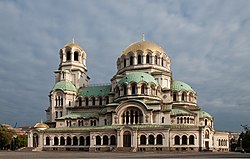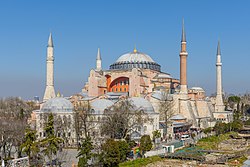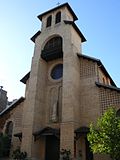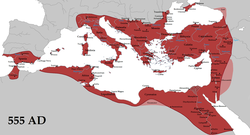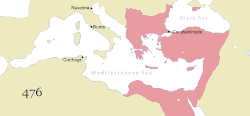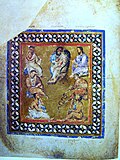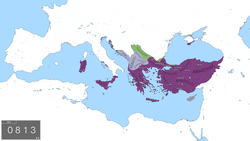Neo-Byzantine architecture (also referred to as Byzantine Revival) was a revival movement, most frequently seen in religious, institutional and public...
24 KB (2,343 words) - 05:52, 15 February 2025
Byzantine architecture is the architecture of the Byzantine Empire, or Eastern Roman Empire, usually dated from 330 AD, when Constantine the Great established...
39 KB (4,334 words) - 03:28, 17 May 2025
to the Byzantine architecture, called the Neo-Byzantine style. Russian-Byzantine style became an officially endorsed preferred architectural style for...
69 KB (4,757 words) - 05:52, 15 February 2025
Russian architecture that arose in the second quarter of the 19th century and was an eclectic melding of Byzantine elements (Neo-Byzantine architecture in...
21 KB (1,892 words) - 13:45, 2 November 2024
Serbo-Byzantine architectural style, Neo-Byzantine architectural style or Serbian national architectural style is the style in Serbian architecture which...
8 KB (927 words) - 15:39, 24 February 2025
Nazi architecture 1933–1944 Germany Neo-Byzantine architecture 1882–1920s American Neoclassical architecture Neo-Grec 1848–1865 Neo-Gothic architecture Neolithic...
48 KB (2,932 words) - 17:34, 6 May 2025
Bristol Byzantine is a variety of Byzantine Revival architecture that was popular in the city of Bristol from about 1850 to 1880. Many buildings in the...
6 KB (549 words) - 17:11, 28 June 2024
influenced by the Byzantine art tradition. The architectural school was also promoted as a counter to the dominance of Western styles such as Neo-Baroque. The...
5 KB (499 words) - 19:08, 9 September 2022
Byzantine Italy was made up of those parts of the Italian peninsula under the control of the Byzantine Empire after the fall of the Western Roman Empire...
1 KB (131 words) - 14:21, 13 May 2025
Post-Byzantine era (16th-18th c.) Modern church buildings belonging to the Byzantine Revival architecture also known as Neo-Byzantine architectural style...
1,006 bytes (141 words) - 11:58, 16 November 2023
the 15th century. Byzantine may also refer to: Byzantine architecture Byzantine Revival architecture, a.k.a. Neo-Byzantine architecture, an historicist...
2 KB (230 words) - 05:37, 22 September 2024
Roman usurpers List of Byzantine usurpers Succession to the Byzantine Empire List of Roman and Byzantine empresses List of Byzantine emperors of Armenian...
112 KB (3,467 words) - 02:33, 12 May 2025
Revival architecture and Neo-Grec (revivals of Ancient Greek architecture) Byzantine Revival architecture (revival of Byzantine architecture) Bristol...
11 KB (1,007 words) - 10:34, 18 February 2025
Pierre Sardou in a combnation of the styles of neo-classical architecture and neo-Byzantine architecture, a blend very popular in that period. In 1919...
7 KB (717 words) - 11:18, 23 April 2025
of Neo-Byzantine architecture are present in buildings such as Vuk Foundation House, the Old Post Office in Kosovska street, and sacral architecture, such...
29 KB (2,528 words) - 16:33, 24 February 2025
term Byzantine commonwealth was coined by 20th-century historian Dimitri Obolensky to refer to the area where Byzantine general influence (Byzantine liturgical...
7 KB (687 words) - 15:56, 21 April 2025
Byzantine and Post-Byzantine Musical Instruments Museum of Byzantine Culture Neo-Byzantine architecture in the Russian Empire Norman-Arab-Byzantine culture...
17 KB (1,541 words) - 22:31, 13 February 2025
the junction of Berkley Street and Princes Road. Built in the Neo-Byzantine architecture style, it was completed in 1870. The architects were W. & J. Hay...
3 KB (331 words) - 11:16, 11 May 2025
Byzantine Dark Ages is a historiographical term for the period in the history of the Eastern Roman (Byzantine) Empire, from around c. 630 to the 760s...
11 KB (1,328 words) - 05:23, 5 May 2025
Palace" (built in the 17th century), between 1956 and 1960 in neo-Byzantine architectural style. Its general plans were designed by George Nomikos in Athens...
3 KB (231 words) - 19:01, 30 October 2024
art, architecture, literature and technological achievements were built. Byzantines stood behind several technological advancements. Byzantine science...
25 KB (2,838 words) - 06:17, 15 February 2025
Byzantine studies is an interdisciplinary branch of the humanities that addresses the history, culture, demography, dress, religion/theology, art, literature/epigraphy...
22 KB (2,404 words) - 00:01, 5 May 2025
The Byzantine Empire under the Justinian dynasty began in 518 AD with the accession of Justin I. Under the Justinian dynasty, particularly the reign of...
19 KB (1,841 words) - 19:58, 18 May 2025
New Classical architecture, also known as New Classicism or Contemporary Classical architecture, is a contemporary movement that builds upon the principles...
31 KB (2,765 words) - 22:18, 16 May 2025
Byzantine romance represents a revival of the ancient Greek romance of Roman times. Works in this category were written by Byzantine Greeks of the Eastern...
6 KB (636 words) - 23:16, 29 October 2023
emperors Byzantine Empire portal Family tree of Roman emperors List of Roman emperors List of Byzantine emperors History of the Byzantine Empire Byzantine Empire...
27 KB (248 words) - 21:22, 18 May 2025
Europe was due to the skill and resourcefulness of the diplomacy of the Byzantine Empire, which remains one of Byzantium's lasting contributions to the...
12 KB (1,252 words) - 09:41, 20 October 2024
Nikephorian dynasty of the Byzantine Empire began following the deposition of the Empress Irene of Athens. The throne of the Byzantine Empire passed to a relatively...
6 KB (352 words) - 08:30, 17 April 2025
Byzantine currency, money used in the Eastern Roman Empire after the fall of the West, consisted of mainly two types of coins: gold solidi and hyperpyra...
19 KB (1,976 words) - 16:58, 19 September 2024
life, art, architecture, technology, and military prowess, ultimately leading to the empires Medieval peak. This Macedonian era of the Byzantine empire was...
15 KB (1,692 words) - 14:23, 10 April 2025

